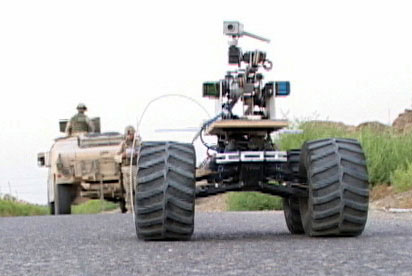
Is this the direction we’re headed?
This past Sunday I watched the Democratic presidential candidate debate held at my alma mater, Drake University. I did the same thing earlier in the month when the Republican candidates spoke at the university. Instead of finding inspiration, I came away from both debates with the sense that something important was missing from each. Specifically, no candidate approaches today’s important issues of health care, education, the environment and war from the perspective that the near-term future of all of these issues will almost certainly will be different-and perhaps radically so-because of the accelerating pace of technological change.
Let me provide just a few recent examples. Last week, the Pentagon reported that it had begun arming robots with guns for the first time ever. The following day it announced that it intended to triple the number of robots in battlefield situations by 2010. And by 2015-a date that would place it near the end of the next president’s second term-the Defense Department has publicly stated that it expects one-third of the U.S. fight force to consist of robots.
If this holds true, it will be a shift of historic proportions and it would be helpful to have the current crop of future would-be commanders-in-chief explain their thinking on the morality of machines making life-and-death decisions and, more broadly, whether they think the wide-scale use of robots will lead to more or less wars like the one we are now engaged in Iraq.
Earlier this week another scientific advance with profound public policy implications was announced when a handful of publications touted the remarkable amount of progress scientists are making in creating artificial life forms. According to the reports, most experts agreed that it is reasonable to expect a breakthrough in this field in the next three to 10 years and one scientist was even quoted as saying “We’re talking about a technology that could change our world in pretty fundamental ways.”
To my way of thinking, anything that can change our world in “pretty fundamental ways” is appropriate fodder for a presidential debate. These synthetic life forms are purported to be capable of wonderful things like fighting disease and efficiently creating new forms of clean, sustainable energy. They might also, however, be used for more nefarious purposes. At a minimum, it would be helpful to hear how those now wishing to lead this country think about this issue and whether they want to boldly lead us into this brave new world or, alternatively, prevent scientists from even attempting to explore synthetic biology’s potential.
Lastly, hardly a day seems to go by without some new advance being touted in the field of computers, Internet technology, voice recognition software, and the development of new immersive virtual reality and social networking technologies. It is not much of a stretch to think that these advances will deeply alter the educational environment of the future. Yet instead of hearing a word about how any of these new technologies might impact education, all too often we are offered only stale platitudes about an issue all the candidates claim is at or near the top of their agenda.
Not all of the blame for failing to address the future can be laid at the feet of the candidates. Few in the media attempt to pose thoughtful questions along these lines and most citizens are more naturally concerned with more immediate issues that confront them on a daily basis. Alas, these are merely excuses. One true test of leadership is a person’s ability to think about the future and, when appropriate, begin preparing others for a new future. A debate offers the perfect forum to achieve both goals.
Isaac Asimov once wrote, “It is change, continuing change, inevitable change, that is the dominant factor in society today. No sensible decision can be made any longer without taking into account not only the world as it is, but the world as it will be. This, in turn, means that our statesmen, our businessmen, our everyman must take on a science fictional way of thinking.”
Well, yesterday’s science fiction-the stuff of robotic warriors, artificial life forms and virtual reality-is quickly becoming today’s science fact. Future debates have the potential to both enlighten and educate, but in order to achieve this goal the candidates, the media, and the public need to first adopt a more “science fictional way of thinking.”
Jack Uldrich is a Drake graduate. He is the author of numerous books and his forthcoming book, Jump the Curve: 50 Strategies for Dealing with Emerging Technologies, is due out in 2008. He formerly worked in Governor Jesse Ventura’s cabinet as the director of the office of strategic and long-range planning.
